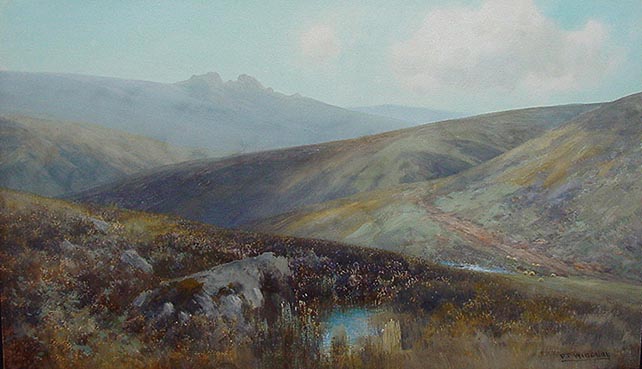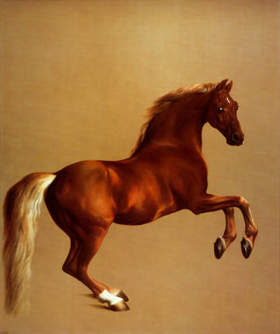
Flight from Dartmeet….
| I wrote this in April 2002.... apparently.... | ||||
 |
||||
| The
full moon was a Godsend as the rider crested the ridge. Robin Thornley knew
the Moors as well as any man, but without the aid of its light he and the
mare would have plunged headlong down the reverse slope to a ruinous fate
among the rocks strewn across its face. Almost like man-made cairns the
granite stones, unique to Dartmoor and Exmoor, though rather smaller than
most or the tors for which the region was famed, gleamed silver amongst
the grey of the grass, like so many tombstones: an apt simile had man and
horse continued their hand-gallop without checking.
Thornley had reigned in the mare, her sides heaving and sweat lathering the edges of the saddle and around her bridle. He dismounted and trotted the beast down to the lee of one of the rock formations, tethering her to the branch of a gnarled and stunted tree he found there. After loosening the girth of the saddle and dislodging it away from her withers he briskly rubbed the sweat from the horse’s flanks with a blanket. There was no stream nearby to allow her a drink so he used water from his own flask to pour over her head and flanks, steam coming off her and her muscles twitching. He would have to rest her for a while before continuing, though he surely hoped that their pursuit was far behind and had actually lost him on the vastness of the moorlands. Relocating his pistol from its pommel mount to his belt and removing the saddlebags, he cast the blanket across the mare’s back and climbed back up the slope to the ridgeline. Finding himself a vantage point that afforded some protection from the wind that howled over the hillside, Thornley wrapped himself in his fortunately very heavy cloak and scanned the open valley and dalelands spread below him. The clear night sky allowed him to view the several twinkling lights of the village of Bovey Tracey clustered around its church and sheltered under the mass of Bovey Rock almost two miles distant. Between there and where he lay the crofters’ and shepherds’ cottages were all darkened, those folk mostly going to bed with the setting of the sun, and he could see the midnight patches of woodland and steep coomb amid the gentler-inclined starlit moorlands. The larger tors were also visible at some distance: stacks of weathered granite and quartz, often as tall as the houses of Totnes and Plymouth town, quite alien to any Englishman not born and bred in this part of Devonshire. Indistinguishable, except by sense of smell in the dark, lay swathes of bracken fern, gorse, flax-leaved St John’s wort and purple and white heather, still pungent despite the strength of the wind. There was not a sign of Allerby’s troopers. After several minutes, Thornley was satisfied that he was, at least temporarily, in a region of safety. He uncorked his flask and sipped sparingly, the water too chilled to be pleasant on such a night. Wrapping the collar of the cloak more tightly about his neck he muttered a quick thanks to the Lord, the actual words of which would likely have earned him a reproach from a passing parson had there been one, and a nod of gratitude to the young Worston boy, whose warning had precipitated his escape when the soldiers had almost trapped him inside the tavern at Dartmeet. The clannish and insular nature of the inhabitants of the moors meant more than their loyalty to the distant Crown, and Thornley had been long minutes gone before Captain Allerby and his men had crashed into the drinking-house, to be met by nothing more than sullen lips below gloating eyes. To the people of Dartmeet, Robin Thornley was one of their own, and his trade of smuggler no more unusual or abhorrent than if he were an ostler or fieldhand. The taxes increasingly imposed by the government collectors also meant that his contraband was more than welcomed by any innkeeper between Cornwall and Wessex, notably French spirits which were more and more difficult to come by due to the strained relationship between the two countries. Naturally, the fraternity of those who visited the taverns felt the same way, and the King’s men found themselves continually at a disadvantage as they persecuted their campaign against the loosely organised bands of smugglers. The stale cheese and rinds of gammon found in his saddlebags were poor substitute for the intended supper he had been settling down for in Dartmeet, but sufficient. Thornley’s mood would have been more improved though with the ability to smoke his pipe, rendered impossible by both the high wind and his need for discretion, by a warm fire rather than freezing on a hillside in late winter. He watched a few wispy clouds scudding across the sky and settled back down to his vigil. After a half hour had passed he watched dismally as those few clouds were replaced by a fast encroaching wall of darkness, signifying the imminent arrival of rain and the loss of the up until now moonlit landscape. Such weather was common on the moors, as the generally northbound wind quickly blew in clouds from the nearby sea, which discharged their precipitation upon reaching the high ground upon which Dartmoor stood. Within a further half hour the rain had arrived.Making sure his pistol was kept dry by his cloak, Thornley raised himself before the ground became wet and decided that the mare must be sufficiently rested for him to continue his journey. He was turning to face the rocky slope where she was tethered when he froze. Quite clearly he had head a voice call out. He ducked back down and surveyed the scene in the direction from which he thought the cry had come. The rain, now falling steadily was reducing his sight to a mere thirty feet or so: he saw nothing. With nothing to be gained by remaining where he was, he crept low off the ridge and started making for the point a hundred feet downwards to where he had marked his mount to be. “Stand there, in the name of the King!” A little to the left of where he had lain, a trooper had ridden to a halt atop the ridge. Sparing the figure no more than a moment’s glace, Thornley leaped down the slope. He heard the rider spur on in pursuit and knew that he must stand, or else be ridden down short of his objective. He saw close ahead of him a stone pile, about fifteen feet across at the base, narrowing to a flat top at about twice his own height. Its sides were tiered and shallow enough for him to climb to the summit without slowing his pace and he did so with not a moment to spare as behind him he heard a clatter of hooves as the mounted man arrived at the base of the granite tor. The soldier was waving his sabre, having discarded his carbine as either useless in the rain or unprepared for firing. He careered around the base of the rock shouting loudly, but could not come close to the smuggler without dismounting. Thornley was breathing heavily, but regained his composure enough to ascertain that the man certainly had comrades near enough for the trooper continued calling for assistance. The man was obviously not fool enough to give up his current advantage and attempt to clamber up the rock to take on the fugitive on his own, even though Thornley seemed to be unarmed. The smuggler could not remain where he was. |
|||||
